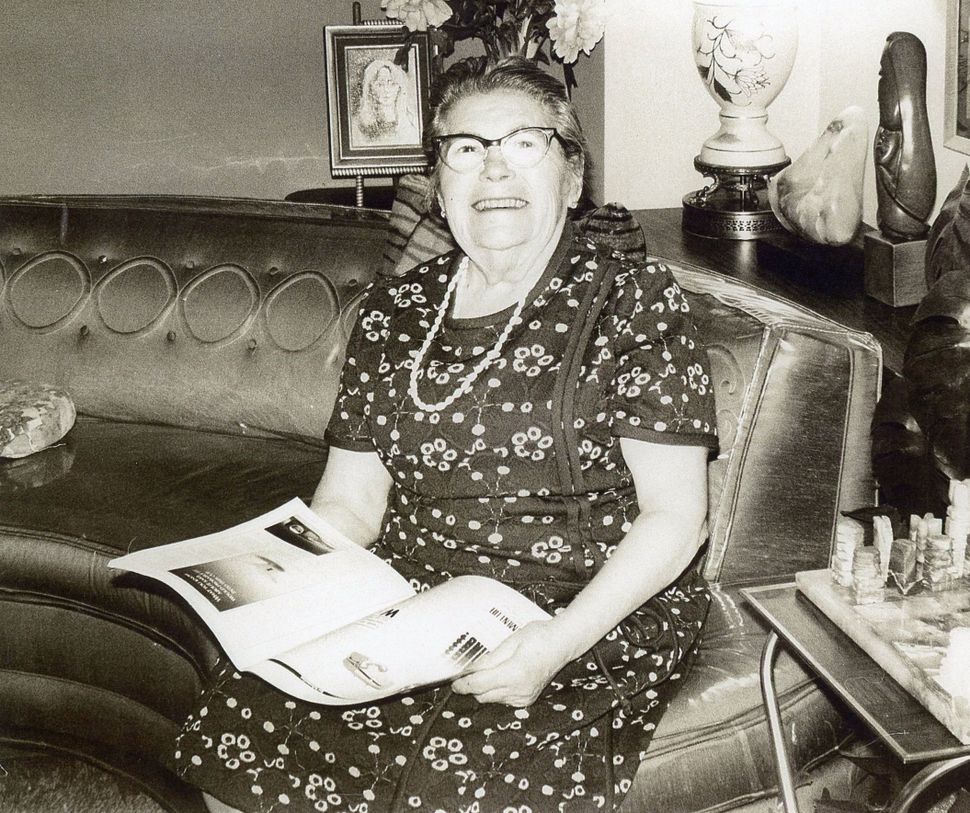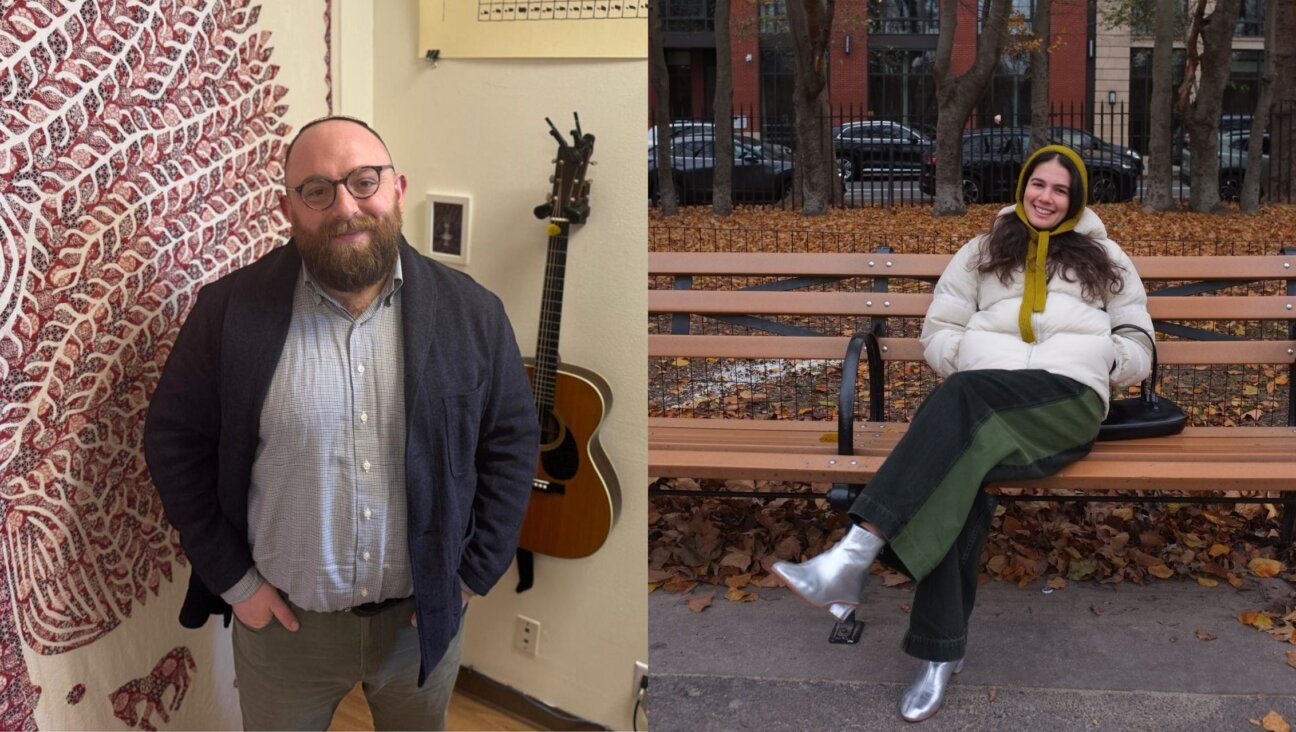My Hero Grandmother Who Escaped An Arranged Marriage

Image by Courtesy of Laurie Gwen Shapiro
I knew my grandmother Fanny Meiselman only as a tiny old woman who smelled faintly floral. I never really questioned why she spoke English so well while I had to make do with Yinglish when I talked with my other grandmother. Grandma Fanny used to chase me with bobby pins to get my unruly thick black hair out from in front of my eyes so she could see “my beautiful face.” Everyone in the family thought I looked like a mini version of her, and she thought so too. Once she told me that as a young woman she swooned over Rudolph Valentino even though he wore mascara. I slept at her place by myself just a few times, and each time she kissed the TV and called Walter Cronkite her boyfriend.
When I was nine, I joined my mother Jeanette Meiselman Shapiro to conduct an oral history of my grandmother’s dramatic escape from an arranged marriage — a thesis project for Mom’s 1970s feminism class at Pace University, where she had returned to school to finish her degree.
Not long ago, while reading a current story about girls forced to marry young for religious reasons, I felt renewed rage and pride at how daring my grandmother had been at the turn of the last century. My mother died nine years ago and only recently, when I was cleaning out a closet, did I dig up her yellowed notes on her mother’s escape and early life in America. Not everything was familiar, as I had been asked to leave the room for the more sensitive conversations. With the aid of the Internet and more oral interviews from remaining family, I’ve kept going where my mother left off.
•
Shortly after May Day in the spring of 1895, under the Austro-Hungarian crown, a baby girl named Feige was born to Rachel and Solomon Forstenzer, observant Jews of Galicia. Feige’s dorf was on the rural outskirts of Tarnów, a small walled city 45 minutes east of Krakow. When Feige was five, Emperor Franz Josef came through the town in a big coach with white horses. All cheered the man they called “Ephraim Yossele” because he protected the Jews and did not allow pogroms during his reign.
Before he’d married Rachel, 61-year-old Solomon had been married to a woman named Devorah, who’d died giving birth to a daughter named Tema. The matchmaker had seen an opportunity and set him up with 16-year-old Rachel, who adopted Tema and then gave birth to Feige. Although they were seven years apart, Feige and Tema were inseparable, playing together, speaking Yiddish at home and Polish when necessary with the Christians.
When Solomon died, Rachel was now a young widow of 25 with two girls, she was cruelly matched to yet another old widower — 63-year-old Mr. Gastman, who had five children of his own and wanted little to do with these girls who were not his own. Tema was offered a first-class ticket to travel by ship to serve as a maid for a family in Chicago, if she would agree to assume a friend’s identity; her friend did not want to leave her family. Tema agreed.
Feige grieved over Tema’s absence. Mr. Gastman demanded that Rachel send Feige to her parents, who lived a wagon’s ride away along the Wisłoka River in Przecław. Approximately 150 people lived in the small town, including poor Jews who specialized in producing prayer shawls.
Shendele, Feige’s grandmother, ran the small general store in town while her husband, the melamed (teacher), taught Hebrew to local boys in a dusty school, and she put her new charge right to work. Considered able-bodied at seven, Feige’s duties were to bring her grandmother heavy buckets of water she got from the village well, fill the water barrels, help make feather beds and wash the wooden floors of their hut and the store. After she finished her chores, she minded the store, calling her grandmother when a customer came in.
If Feige found her grandmother cold and spiteful, she adored her grandfather Moishe. She called him Zadah. Feige ran to Zadah when she had her first menstrual period, and he was the one who told her what a woman is, albeit with a talmudic point of view, stressing her duty to husband and children.
Zadah had received letters from America — from cousins in Coney Island — written in Yiddish, and as he read them out to her, she dreamt of going there herself. She could picture New York from the letters: trolley cars, something called a hot dog, and most enticing of all, flush toilets.
Feige developed physically quite early, at 10 (with large breasts her daughters and granddaughters would inherit), and seemed older than her years. When she was 11, she was hired out by her grandmother to Przecław’s matzo maker to care for his 11 children. Shendele felt it was time to settle the marriage. In the traditions of the shtetl, girls as young as 12 were married off.
Zadah argued with his wife. He was poor but learned, and he felt dissatisfied with his granddaughter’s Hebrew education: She had gone for only two years. She was too young to be married. He wanted her to go to the Catholic school to get a general education.
Shendele seethed. Who would help her if she went to school? The day Feige was to begin, vengeful Shendele bandaged her arm and said it was broken, and therefore Feige couldn’t attend. She threatened Feige with a stick if she contradicted her. That was the end of her European education.
Feige’s Zadah gave up; he was no match for his wife. Shendele looked around the village for a suitable match, but there was no dowry to offer. She decided to marry her to a redheaded, bearded relative — her mother Rachel’s brother, a middle-aged man who was newly widowed with seven children. Feige wept. She hated this uncle. Get her hair cut off? She loved her thick black hair. The thought of having to go to a mikveh especially horrified her. Why did everyone make her feel her period was dirty? She found it hard to believe her cousin in Coney Island eating hot dogs had to go to a mikveh.
But after Shendele went to bed, Zadah woke his beloved granddaughter. They went out into the night air and he handed Feige a tied kerchief of bills he had stolen from his wife, the beginnings of savings to pay the cost of steerage to America. It wasn’t quite enough, so he’d made arrangements for her to go to Leipzig, to a relative who needed a girl in the house to care for her nine children. That would be her board and safe haven. But he wanted her to supplement the money he was giving her by peddling. When she had enough, she could go to a cousin in the Bronx. Did she have the nerve to do this? Feige assured her grandfather that she did.
Zadah pinned the address and money to her bodice. They laughed together about how they had fooled the old bitch. They clasped each other tightly because they would probably never see each other again. When a cart quietly drew up in the dirt yard, she left for the German border before her grandmother awakened.
Feige stayed in Leipzig for two years with the relative, peddling shoelaces. One day, looking for new customers, she walked into an Army camp. The officer in charge, feeling sorry for the young girl, lined up his soldiers every payday and made them buy her wares, giving them the stiff warning that anyone who touched a hair on her head would be shot on sight.
Finally, in 1908, Feige had enough money for her passage to America. She even had a little extra for a train trip home. She decided to risk the consequences and took the train from Leipzig to Tarnów to say goodbye to her Zadah, and mother, Rachel. First she went to see her mother, who cried hard at seeing her. Rachel gave her a mortar and pestle, then Feige fearfully arranged a wagon ride to the country. Her grandmother could barely look at her, but Zadah was elated. Feige said she would make money for the family, then come back to marry the man her grandmother had picked out for her. She later told her grandchildren that she had her fingers crossed behind her back because she was lying, but she couldn’t cross the ocean without seeing her Zadah one more time.
Grandmother offered no kisses goodbye. But Zadah held her tight before their last goodbye. Feige headed by wagon and train to Hamburg, but there were delays. When she arrived, she had literally missed a boat, but that was a good thing, as she heard that boat later sank, along with its passengers. The Hamburg-American Line had a steerage spot available on the Graf Waldersee. Built in 1898, the ship was one of four sister ships, and it held 2,200 in third class.
Two weeks later, on a wharf by the Hudson River, Feige stepped off the tub that had miraculously crossed the Atlantic Ocean at a maximum speed of 14 knots. She had been ill the last week of the journey, deep in the airless steerage hole, sucking lemons and very little else. The first-class citizens landing on Manhattan soil were free to go, but she joined the sorry line for the ferry to Ellis Island. Feige paid $4 in taxes there, and took an American name: Fanny.
At last Fanny was cleared. She was met by a cousin named Solomon Glanz and joined by another relative — Philip, whose name had been pinned in her bodice a few years back in Przecław. She traveled with Philip to the East Bronx, where he explained she was to serve as a maid to his family. Although she was awed by the newness and vastness of New York, teeming with 4 million residents, she soon saw her situation was much the same as it had been in Europe. Philip’s wife was gravely ill. There was a brood of six children to care for. Two years went by. Two years of drudgery, washing, ironing, cleaning, cooking and wistfully watching their children at their schoolbooks. Galicia. America. What difference did it make? Here she was a slave again.
What joy Fanny felt when she was united with old friends from her village who had come to America and knew the ways! “Get wise!” these freethinkers told her. “Leave before you wind up an old lady at 17. Come work at the shop with us! We’ll get you a job and we’ll find you a place to live.”
•
I was nine when I joined my mother to “help” interview my grandmother. When Mom started asking about this solo period of her life, Grandma Fanny showed us old photographs, her thick black hair piled high above her head. She wore dainty batiste shirts with leg-of-mutton sleeves.
My grandmother found a room in what is now Hamilton Heights, in a brownstone at 540 136th Street (which was torn down in 1926 to make way for an elevator building). Her landlord, Isaac Weinstein, was a 55-year-old furrier from Russia with a 44-year-old wife, Bertha, from Germany, and their children were grown. Now Fanny had the first decent living quarters of her life. She would often buy herself lilacs to brighten her room, and she filled her drawers with lavender, a floral habit she would maintain until she was an old lady.
Fanny worked in an embroidery sweatshop earning, at first, $2 a week, then gradually $5, $7, and finally $10. She laughed at the other seamstresses’ complaints. This wasn’t work! She was bent over her machine until the owner got tired at six or seven o’clock at night.
My mother, who was all fired up by her charter subscription to Ms. magazine, tried to get Fanny to speak more about the miserable working conditions in a sweatshop, but Fanny would let nothing spoil her memories. She described with gaiety the clothing she had bought and made and the beautiful feathered hats she had worn. She bought herself an onyx ring with three diamonds, putting aside a dollar a week until she could buy it — my cousin Jackie, the eldest of Fanny’s grandchildren, has that ring now. Fanny laughed, describing how all the pretty greenhorn girls rode the Fifth Avenue double-decker buses down to the Battery and walked along the promenades, blushing when men in straw hats whistled. She would go pretend shopping in expensive stores, fingering the shawls and sweaters as if she could really buy them. Sometimes she would take a subway to Coney Island, dressed in a knee-length striped bathing suit. She would go with large groups to the Yiddish theaters and for ice cream sodas on Second Avenue.
Grandma Fanny swore to my mother that among this set a women’s virginity was to be preserved until marriage — any behavior to the contrary was for the girls with bobbed hair girls with the Clara Bow lips and the net stockings.
Fanny was a bachelorette for nine happy years. World War I came, and the sweatshop girls volunteered at the Red Cross. She attended an Armistice Day celebration party where she caught the eye of a private in the Army: Jacob “Jack” Meiselman, who was to become my grandfather, although I would never meet him. His baby blue eyes and blonde hair mesmerized her.
On Fanny and Jack’s first date, they went to see Grant’s Tomb, where they alternated telling their life stories in English and Yiddish.
Jack, a shirtwaist supervisor who had also come to the U.S. on his own as a teen, was 10 years older than Fanny. He was also from a small town in Galicia, but he was an ardent Socialist who had proudly shucked not only his old first name, but also the old ways. He seemed so worldly, even though he would soon reveal that he had spent the war years peeling potatoes on kitchen patrol. Though he was self-taught, he could still read and write, and was popular with his set. My grandmother would not always have such kind thoughts about him, but their courtship was a brief period of passion in her life. New love feels like you’ve been given a set of wings.
•

The Newlyweds: Fanny and Jack Meiselman, circa 1920. Image by Courtesy of Laurie Gwen Shapiro
Fanny and Jack were married on February 1, 1920. The tiny bride of 4-foot-10 was the queen of her new apartment in West New York, New Jersey, across the Hudson by the Palisades. She bought brand-new kitchenware: rolling pins and bowls, all of which have stayed in the family.
In October of that year, her rebellious redheaded half sister Goldie Gastman made her way over from Przecław, and lived with the newlyweds until she could get a room of her own. My grandmother was eight months pregnant with her first child, Sol, named after her deceased father. Sol, despite being the child of two immigrants who lacked an elementary school education, would go on to become a rocket scientist for NASA. Goldie, 10 years younger than her half sister, was sexy and flirtatious. She liked to smoke cigarettes with her brother-in-law while wearing revealing outfits. The family story is that Goldie’s visit was not good for Fanny and Jack’s marriage.
Goldie moved out. Jack was still in the needle trade, and things were going poorly. Fanny convinced him to open a small store in nearby Leonia, New Jersey. Under Fanny’s guidance, the little New Jersey candy store developed into a luncheonette, added a dry goods section, then an ice cream parlor, until it was a full-time thriving general store with primitive pinball machines. While Fanny raised six children and ran a store, Jack became a leader in the local New Jersey Socialist party and spent his free time with his political cronies. There were long absences from the marriage, gambling at pinochle, and suspected infidelity. My mother loved her father, Jack, and I can only imagine her pain as she wrote the note, “Ma says he was all for the masses while he ran roughshod over the woman he had married.”
Even after the 1929 stock market crash, Jack’s Candy Store managed to stay afloat. The Meiselmans of Leonia would have picnic lunches at Fort Lee and watch the construction of the George Washington Bridge. My mother’s favorite childhood story was how, for the 1931 opening of the bridge, her father put her on his shoulders to watch the fireworks. My mother’s older sister, Etta Kutner, a retired professor, still thriving in Boca at 94, confirmed that this actually happened, as did other tales I always questioned. For example, they were led into the Leonia school yard to see the Hindenburg — with swastikas on it — float above a day or two before it exploded, and their father was visited by the Klan, angry that a Jew was expanding his store. “All of those stories are true. I was there too,” Etta told me.
According to Aunt Etta, my grandmother was completely in charge of ordering, inventory, paying bills and banking, even though she could only write her name. My grandfather charmed the customers as my grandmother waited on them.
•
Every year, another baby was born. One or two pregnancies resulted in miscarriage, and one baby was stillborn. Six lived, four girls, and two boys, each separated from each other by one or two years.
Fanny tried to abort her last child by lifting heavy cases of soda, to no avail. Finally, the Depression hit Leonia too. The Meiselmans were locked out of their own store; a sign that said “Bankrupt” was nailed to the door.
The family of eight moved to New York where they lived in a dingy railroad flat at 637 East Sixth Street on the Lower East Side. Poverty made Fanny and Jack cling a little closer to each other.
The Hebrew Free Loan Society lent them some money to open a small candy store on Brook Avenue in the Bronx. In the midst of their financial worries, they were also worried about the attitudes toward Jews in Europe. Fanny had somehow squirreled away enough to bring her mother to the U.S. in 1932, and she stayed with Goldie a block away, on East Fifth Street.
Business got worse as World War II approached. The store closed. Jack took a part-time job in a factory, and worked most weekends in a fruit store. Their second son, my still-living Uncle Sam, a ski trooper in the elite 10th Mountain Division, was reported missing in action. There was no word about Sam for months until… there was. A victim of shell-shock, he was put in a veteran’s mental hospital for two years. My grandparents aged rapidly.
Then one bleak February night in 1947, my chain-smoking grandfather returned from work, dropped to the floor in front of my grandmother, and died instantly from clogged arteries and stress. Fanny was a widow at 51.
Although she had two marriage proposals, Fanny decided that she didn’t need to take care of anyone but herself. In 1970, Fanny decided, at 65, to become an embroidery inspector, utilizing the knowledge she had accrued during her sweatshop years. She would take the subway daily from the Bronx to Manhattan. She often gave the rejected fabrics to her granddaughters to use for costumes and dress up.
Fanny was a compassionate elder admired by the young workers, who helped teach her enough Spanish and Italian to talk to staff at work. She took night classes in English, history and math at P.S. 37 in the Bronx. When she graduated from elementary school in her 60s with other adult learners, her six children came to the ceremony.
Fanny’s mother, Rachel Gastman, died in 1957. No one knows exactly when her half sister Goldie Gastman died, but she seems to have died young.
Eventually, her daughter Etta helped her secure a brand-new apartment in Co-op City, in the Bronx, which she kept sparkling clean. She kept a kosher home, especially because her husband the Socialist had mocked her for doing so before he died. Still, she rarely went to synagogue, partly because she was embarrassed that she could not read Hebrew.
I was okay with most of the strange foods she served me on those grandma visits, like the salty matzo ball soup and kreplach, but the schmaltz she loved and spread on toast for me made me gag, and when she wasn’t looking, I spit it into my napkin and went to the bathroom to flush it away.
According to Fanny’s son-in-law, my 96-year-old father, Julius, her three living children (Etta, Sam and Mollie) and her 14 grandchildren, she was a kind woman who found contentment in her later years. She would sing lullabies she’d learned in the old country to her grandchildren to put them to sleep. But my female relatives also remember this well: Fanny hated all men with red hair, and any man with a beard, and even begged my cousin Jackie to break up with a bearded man. Perhaps there was sexual abuse in the village, maybe even by the uncle she was to be betrothed to, but we’ll never know for sure. Maybe her aversion originated simply from the memory of being told she had to marry a redheaded relative she did not like.
•

Fanny and Granddaughter: Laurie Gwen Shapiro at her Bat Mitzvah with Fanny Meiselman, 1979. Image by Courtesy of Laurie Gwen Shapiro
Grandma Fanny died at the age of 90 the spring semester of my first year of college. I had taken a $35 People’s Express flight home from Syracuse to say goodbye after my Aunt Mollie in New Rochelle called my mother hysterically crying to tell her children that it was perhaps their last chance to see their grandmother alive. I often think of the plastic casing on the couch, which I used to find particularly embarrassing (by college, I was dating only wealthy Protestants who frowned on such vulgarities).
Where I had once been proud, I was newly ashamed of my shtetl stock. My feminist mother was disgusted that I had lost pride in my heritage, and reminded me that there was a good reason nobody was messing up Grandma Fanny’s spotless apartment. In her eighth decade, Fanny Meiselman had finally landed a home of her own.
In the late 1990s, when I became a professional writer and documentary filmmaker, my mother tried to interest me once again in her mother’s story. Mom had won journalism awards in high school but had been forced to quit City College after a year to support her mother and sisters while her two brothers went to war and college. She repeatedly asked me if I would ever write a story about Fanny. I dismissed her suggestions. Why would my dead grandmother be of interest to a larger public? What did she do? “She is part of American history, Jewish history, feminist history; you’ll realize that one day,” my mother told me.
In the end, I decided I had to write this story — not only for myself and for my mother but for my bright 14-year-old daughter Violet who dismisses her family history the way I once did. She has Irish kings in her genes from her dad. What could I offer her after that? The thing that got Violet’s attention was the way my grandmother had traveled to America by herself in steerage when she was just 13 — the same age Violet was when she felt proud of herself for being able to take the subway alone.
















